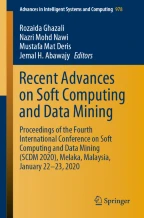Abstract
Twitter has become the most popular social media in today’s world. More than 284 million users are online monthly, and 80% user accesses their twitter account through mobile. A tweet is limited to 140 characters, so it contains concise information about particulars. Due to its popularity and usage, near about 500 million tweets are sent per day that relates to different domains. This work focuses on recommending domain specific keywords for twitter. For this purpose, 10 domains are chosen as a sample. Then we apply Term Frequency-Inverse Document Frequency (TF-IDF) and Log likelihood methods and compared the keywords extracted from both against each domain to make our result much valuable. Furthermore, the categorization of keywords is made as noun and verb, and also finds out the sentiment words. At the end, a relevancy test is performed from five users. These keywords can be great value in clustering tweets data and can be used for identifying a user’s interest in any specific domain. Furthermore, these keywords are of the great asset for advertisement purpose.
Access this chapter
Tax calculation will be finalised at checkout
Purchases are for personal use only
Similar content being viewed by others
References
Asghar M, Mushtaq MF, Asmat H, Saad Missen MM, Khan TA, Ullah S (2014) Finding correlation between content based features and the popularity of a celebrity on Twitter. Int J Comput Sci 11:177–181
Twitter Statistics. https://techjury.net/stats-about/twitter
Twitter. https://about.twitter.com/en_gb.html
Cai Y, Chen Y (2009) Mining Influential bloggers: from general to domain specific. In: Proceedings of 13th international conference on knowledge-based and intelligent information and engineering systems, pp 1–8
Fan W, Bifet A (2014) Mining big data: current status, and forecast to the future. SIGKDD Explor. 14:1–5
Prasad AVK, Saibaba CM (2016) Mining big data: current status, and forecast to the future for telecom data. Int J Priv Cloud Comput Environ Manag 1–10
Agarwal A, Xie B, Vovsha I, Rambow O, Passonneau R (2011) Sentiment analysis of Twitter data. In: Proceedings of the workshop on language in social media, pp 30–38
Lott B (2012) Survey of keyword extraction techniques, Semantic Scholar, 1–10
Jones KS (2004) A statistical interpretation of term specificity and its application in retrieval. J Doc 28:11–21
Wartena C, Brussee R, Slakhorst W (2010) Keyword extraction using word co-occurrence. In: Proceedings of 21st international workshops on database and expert systems applications DEXA, pp 54–58
Matsuo MIY (2004) Keyword extraction from a single document using word co-occurrence statistical information. Int J Artif Intell Tools 13:157–169
Ohsawa Y, Benson NE, Yachida M, Science H (1998) KeyGraph: indexing by a co-occurrence graph based on building construction metaphor. In: Proceedings IEEE international forum on research and technology advances in digital libraries, ADL’98
Wu YB, Li Q, Bot RS, Chen X (2006) Domain-specific keyphrase extraction. In: Proceedings of the 14th ACM international conference on information and knowledge management
Kim SN, Baldwin T, Kan M (2009) An unsupervised approach to domain-specific term extraction. In: Proceedings of Australasian language technology association workshop, pp 94–98
Gelbukh A, Sidorov G, Lavin-Villa E, Chanona-Hernandez L (2010) Automatic term extraction using log-likelihood based comparison with general reference corpus. In: International conference on application of natural language to information systems. Lecture notes in computer science, vol 6177, pp 248–255
Author information
Authors and Affiliations
Corresponding author
Editor information
Editors and Affiliations
Rights and permissions
Copyright information
© 2020 Springer Nature Switzerland AG
About this paper
Cite this paper
Abid, M.A., Mushtaq, M.F., Akram, U., Mughal, B., Ahmad, M., Imran, M. (2020). Recommending Domain Specific Keywords for Twitter. In: Ghazali, R., Nawi, N., Deris, M., Abawajy, J. (eds) Recent Advances on Soft Computing and Data Mining. SCDM 2020. Advances in Intelligent Systems and Computing, vol 978. Springer, Cham. https://doi.org/10.1007/978-3-030-36056-6_25
Download citation
DOI: https://doi.org/10.1007/978-3-030-36056-6_25
Published:
Publisher Name: Springer, Cham
Print ISBN: 978-3-030-36055-9
Online ISBN: 978-3-030-36056-6
eBook Packages: Intelligent Technologies and RoboticsIntelligent Technologies and Robotics (R0)
